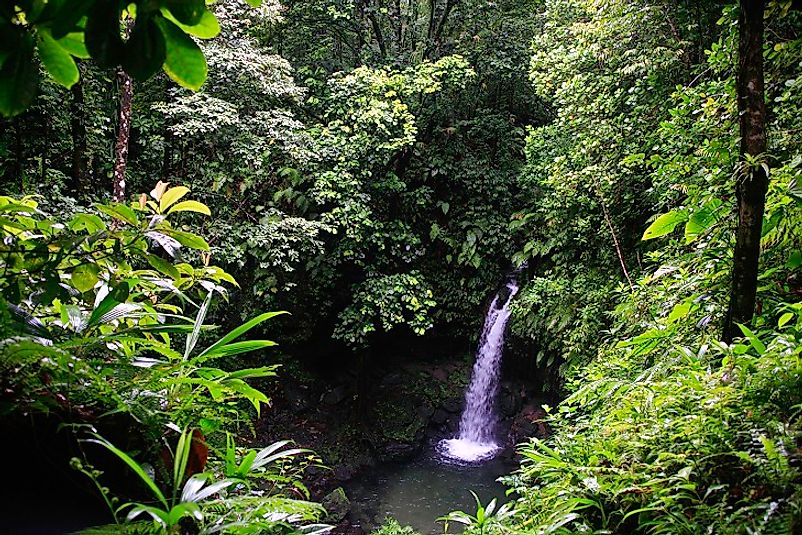Morne Trois Pitons National Park, Dominica

5. Description -
In the southeastern Caribbean Sea sits the small island nation of Dominica, which is where the Morne Trois Pitons National Park is located. The Morne Trios Pitons National Park was established by the government of Dominica in 1975, which made it the first national park in the country and to date one of only three. The park covers a total area of 26.48 square miles (68.57 square kilometers) and it covers part of four of the country's ten administrative parishes, Saint Patrick, Saint George, Saint David and Saint Paul. The park was designated as a United Nations Educational, Scientific and Cultural Organization (UNESCO) World Heritage site in 1997 and is currently the only world heritage site in the country. The park is named after the Morne Trois Pitons mountain, which is located in the park and is the second tallest mountain in the country.
4. Administration -
The Morne Trios Pitons National Park is administrated by the Department of Forest Management and the Vice Ministry of Forest Resources, both pf which work under the Ministry of Environment and Natural Resources which is part of the Dominican government. The Department of Forest Management is responsible for making sure that the regulations that govern forestry activities are implemented and managed correctly. The Vice Ministry of Forest Resources works to manage the country's forest resources,as well as helping to advance reforestation.
3. Tourism and Scientific Research -
The Morne Trios Pitons National Park has many areas that offer tourists lovely and detailed scenic views of the stunning locations that the park has to offer. Due to the park's rare combination of features, ranging from tropical forests, to freshwater lakes, to hot springs and volcanoes, the park offers tourists the chance to explore and experience a wide variety of natural phenomenon in one area. For scientists that park has generated much scientific interest, especially around the scientific study of its geo-morphological process and how they were created and operate. These geo-morphological process center around the parks many hot springs and the five different volcanoes in the park, including the 4,402 feet (1,342 meters) tall volcano, Morne Trois Pitons. That park also has 50 different fumaroles, which are the openings in or by a volcano, which is how hot sulfurous gases emerge from the volcano. One of these fumaroles is the apply named Boiling Lake, which is the second largest hot lake in the world and has been puzzling scientists since it was discovered due to the water being complete drained from the lake periodically for no identifiable reason.
2. Habitat and Biodiversity -
The Morne Trois Pitons National Park house a wide variety of diverse flora and fauna, including endemic species of vascular plants that are only found in Dominica. The park has a away of different habitats and biodiversity, ranging from mountains, valleys, slops and volcanoes to deep tropical forest with rivers, waterfalls and lakes. The park has three different freshwater lakes that along with all of the tropical forest and rivers are able to house some of the richest biodiversity in the Lesser Antilles area of the Caribbean Sea. One the opposite habitat side is the so called Valley of Desolation, which is a area of the park that is steep and has many small geysers and a array of boiling mud ponds.
1. Environmental Threats and Conservation Efforts -
The Morne Trois Pitons National Park faces some environmental threats, including the annual threats from hurricanes and the potential threats arising from seismic activities, which are frequently experienced across the whole island. A major long term threat to the park is from climate change, which besides making these stated environmental threats worse, can also led to longer drought conditions, a larger risk of wildfires occurring and a change in the rainfall patterns. There is also the threat of land degradation, deforestation, loss of habitat, and the introduction of foreign species among other things. Somethings that can be done to conserve the park are for the government to address medium to long term plans to manage a lot of these issues and the problems that cause them to be a threat, like increased development demands, the economic crisis, poverty and the country's lack of rural development.







